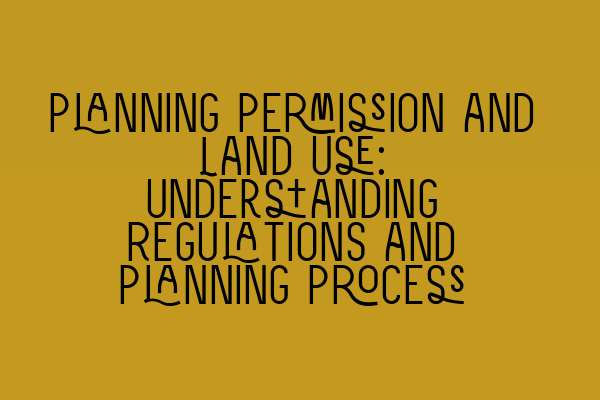Planning Permission and Land Use: Understanding Regulations and Planning Process
When it comes to property development and construction, understanding the regulations and planning process is essential. Planning permission, which governs land use and development, plays a crucial role in ensuring that developments are carried out in a sustainable and responsible manner. In this blog post, we will explore the basics of planning permission, its importance, and the steps involved in obtaining it.
What is Planning Permission?
Planning permission is the formal approval required from the local planning authority for certain types of development or change of use of land or buildings. It ensures that development plans align with local and national planning policies, safeguarding the environment and the interests of the community.
Obtaining planning permission is not only a legal requirement but also an opportunity to engage with the planning process, consider environmental impacts, and address any concerns raised by local authorities or affected parties.
The Importance of Planning Permission
Planning permission is crucial for several reasons:
- Legal Compliance: Developing without planning permission constitutes a breach of planning control and can result in enforcement action, such as stop notices, fines, or even imprisonment.
- Protecting the Environment: Planning permission ensures that development takes into account ecological factors, heritage considerations, and sustainable development principles.
- Neighbourhood Impact: It allows local authorities to assess the impact of developments on the surrounding area, including factors like traffic, noise, and visual appearance.
- Public Consultation: Planning permission involves a public consultation process, enabling local communities and individuals to express their opinions and concerns regarding proposed developments.
The Planning Process
The planning process typically involves the following steps:
- Pre-Application: This stage involves gathering all relevant information, including site plans, architectural drawings, and any required reports or studies, to support the planning application. It’s important to consult with planning consultants or solicitors experienced in property law to ensure the application is comprehensive and meets all necessary requirements.
- Application Submission: Once all necessary documents are prepared, the planning application is submitted to the local planning authority. The authority then assesses the application against local development plans, national policies, and other relevant considerations.
- Public Consultation: The local authority may invite comments and objections from the public, allowing them to express their views on the proposed development.
- Decision Timeframe: The local planning authority typically has eight weeks to determine the application. However, in some cases, the decision timeframe can be extended, especially for complex or controversial applications.
- Decision Outcome: The local authority will inform the applicant of their decision, which can be approval with or without conditions, refusal, or deferral for further information or modifications.
- Appeals: If the application is refused or approved with unfavorable conditions, the applicant may have the right to appeal the decision to an independent planning inspector.
Understanding the planning process and regulations is vital for anyone involved in property development, whether as a landowner, developer, or investor. Seeking professional advice from a property law solicitor early on can help navigate the complexities and increase the chances of obtaining planning permission.
Conclusion
Planning permission is a crucial element in property development and land use. It ensures that developments meet legal requirements, protect the environment, consider the impact on the local community, and engage in public consultation. Understanding the planning process and obtaining professional advice early on enhances the likelihood of obtaining planning permission without unnecessary delays or complications.
For more information on the SQE exams, check out the related articles below:
<
